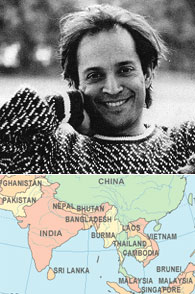Leading Indian writer and poet Vikram Seth has launched a campaign on Saturday against legislation making homosexuality a criminal offence in India, saying the country must fight laws that abuse human rights.

Well-known Indian writer and poet Vikram Seth (top pic) has launched a campaign against legislation making homosexuality a criminal offence in India. He is supported by influential signatories including Nobel laureate economist Amartya Sen, Booker prizewinner Arundhati Roy, the former Attorney General Soli Sorabjee and filmmaker Shyam Benegal.
The letter which was signed by influential signatories including Nobel laureate economist Amartya Sen, Booker prizewinner Arundhati Roy, the former Attorney General Soli Sorabjee and filmmaker Shyam Benegal called on the government to repeal Section 377 of the Indian Penal Code. The colonial-era law, which dates back to 1861, carries a maximum penalty of 10 years in jail for consensual sexual acts between adults of the same sex. It is currently being challenged in the courts.
This is the first time such a campaign backed by a large number of well-known people which has so far largely been taken up by AIDS activists and gay organisations has been launched.
According to Agence France-Presse (AFP), Seth said he launched the drive because he is gay.
"The reason why I decided I would participate in this is that I am gay or at least partially gay," said Seth, author of the best-selling books A Suitable Boy and An Equal Music, who has frequently included central or peripheral gay themes and characters in his novels and much of his poetry.
The 54-year-old Calcutta-born author who studied in Oxford, Stanford and Nanjing universities now divides his time between India and Britain.
"It (homosexuality) has to be discussed, it's going to basically be discussed more and more -- one cannot suppress the happiness of 50 or a 100 million people," he was quoting as saying in a NDTV network interview.
Released in New Delhi on Saturday and addressed to the government, judiciary and Indian citizens, the letter condemned the archaic law as an attack on human rights and fundamental freedoms.
"It has been used to systematically persecute, blackmail, arrest and terrorise sexual minorities," said the letter.
"It has spawned public intolerance and abuse, forcing tens of millions of gay and bisexual men and women to live in fear and secrecy, at tragic cost to them and their families."
Although the law is rarely used, activists say that not repealing the law helps perpetuate social stigma and gives the message to law enforcing agencies that practising gay sex is a criminal act resulting in harassment of homosexuals. There have been reports in the local media of police demanding bribes and harassing same- sex couples in parks and public places.
"It is especially disgraceful that Section 377 has on several recent occasions been used by homophobic officials to suppress the legitimate work of HIV-prevention groups, leaving gay and bisexual men in India even more defenceless against HIV infection," the letter said.
Other signatories include the former U.N. Under-Secretary General Nitin Desai, Bollywood actors, human rights lawyers, leading journalists, academics and filmmakers.
In a separate letter of support, Nobel laureate and economist Amartya Sen called the law a "monstrosity" and said that criminalisation of gay behaviour also curbed the enhancement of human freedoms.
In July, the National AIDS Control Organisation (NACO) - the Indian government's HIV/AIDS control body - filed a statement in the Delhi High Court supporting a public interest petition by a local AIDS charity, the Naz Foundation, has challenged the constitutional validity of the 145-year-old law and demands that it be scrapped. NACO argued that such the current law is driving infections underground and hampering efforts to curb the virus.
"It (the law) can adversely contribute to pushing the infection underground and make risky sexual practices go unnoticed and unaddressed," NACO said in July.
The court rejected the application in 2005 saying Indian society was not ready to accept legalised homosexual behaviour. Naz filed an appeal with the apex Supreme Court, which ordered the Delhi High Court to re-examine its decision.
But Desai dismissed such a defence in the light of a renewed legal challenge: "Minority rights are not at the will of the majority," he said. "Minority rights are absolutely guaranteed by the constitution.
"The issue is not whether the majority of the country is for or against this... but whether there is any reason in law for discriminating against these people."
The open letter has been released in anticipation of a court ruling on the issue expected on October 4.
The former British colony of Hong Kong overturned its anti-sodomy law in 1991 while Britain threw out its anti-Sodomy statutes in 1968. Other former British colonies in the region Singapore, Malaysia, Pakistan, Bangladesh and Sri Lanka�still have pre-independence anti-sodomy laws in place.
Elsewhere in Asia, countries that were not colonised by the British including China, Indonesia, Japan, Korea, Mongolia, the Philippines and Thailand have no laws that criminalise homosexuality.











 列印版本
列印版本










讀者回應
"Minority rights are not at the will of the majority," he said. "Minority rights are absolutely guaranteed by the constitution.
"The issue is not whether the majority of the country is for or against this... but whether there is any reason in law for discriminating against these people."
bunny up ...
Instead of still persecuting us gays in 2006 , shouldn't heterosexuals be thanking us for looking after the future of our planet , the future of their offsprings ?
Food for thought for many I hope.
請先登入再使用此功能。